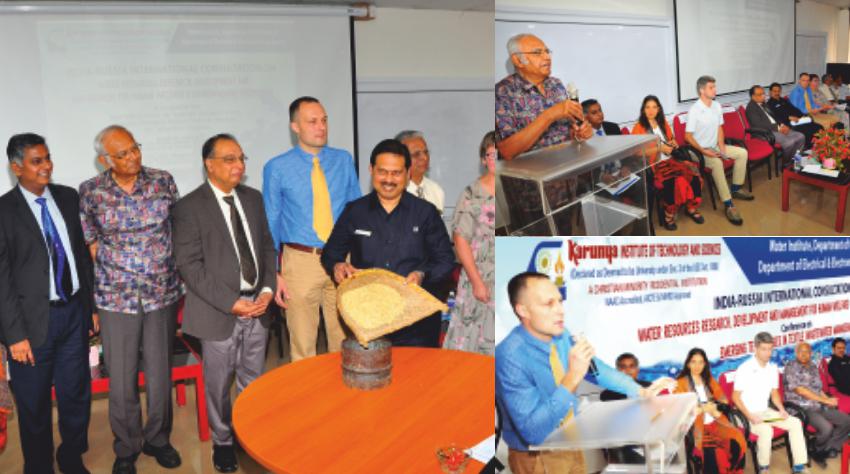The scientists from Russian Academy of Sciences stated that several of their water management practices have great relevance in the Indian context. Four scientists from the Russian Academy of Sciences and another from Environment Canada were holding a two-day Consultation along with Indian counterparts on Water Management, at Karunya Institute of Technology and Sciences, Coimbatore.
Dr Polyianin Vladislav Olegovichof Water Problem Institute of the distinguished Russian Academy of Sciences highlighted the issues related to Moscow water supply system depending on surface water systems based on Moscow, Vazuza and Volga rivers. It is interesting that several of their practices have relevance to the urban water supply schemes of India. They have established a scientific data collection network to continuously monitor water quality changes, to identify and eliminate sources of pollution and to adhere to water quality standards.
Apart from supplying water for drinking, the reservoir systems in the Volga river contain flood waters in spring and the subsequent rainy season immediately, maintain environment or sanitary flows for downstream needs, dilute pollution load in the downstream reaches and maintain the depth for shipping in the river. The reservoir levels are kept low to contain rainwater immediately after filling of reservoirs in winter. They have evolved scientific operation rules to contain flood waters and to assure reliable water supply. In fact, if such provisions were practiced in India, the devastation caused by Chennai and recent Kerala floods should have been brought down. Dr Polyanin admitted that efficient short-term and long-term rainfall forecasting systems would be of great use in operating these reservoirs in an efficient manner.
The waters from Vizuza drain into the Volga river.Vizuza waters are often pumped into the Moscow river slope during periods of water scarcity. Such simple inter-basin transfers have relevance in Indian context, especially in Coimbatore water supply schemes from different river systems. The concept of maintaining environmental flows is gaining momentum in India to dilute pollutant load and maintain the aquatic flora and fauna downstream.
It is stated that even in the city of Moscow, 80% of the sewage disposed does not meet the quality standards. In India, we treat only a small fraction of our municipal waste water. The measures initiated to treat their urban waste water in Russia were highlighted by the experts. Dr LazouraGrogorova of Russian Academy of Sciences narrated her experiences in managing the aquatic ecosystems of Russia. Dr NatialaBelkinaof Karelian Research Centre of Russian Academy explained how sediment characteristics can be used as indicators of the health of lakes or wetlands. The bottom sediments not only bring to light the ongoing physical and chemical processes but also dictate the biotic and abiotic aquatic components of the lake ecosystem. Dr Ivan Rudskiy of the Institute of Limnology of Saint-Petersburg brought to light the techniques used in the management of algal blooms in natural reservoirs. The methods discussed by him include sophisticated physical and chemical approaches. These techniques and methodologies have great relevance in the context of wetland management in India.
Dr Rajasekara Murthy, Emeritus Scientist of Environment Canada highlighted the management of Great Lakes of North America, in which he was involved during the past four decades. He discussed the monitoring mechanisms and measures adopted to prevent pollution of these large fresh water bodies. The policies and acts in vogue in Canada to protect these lake water sources were brought out in his keynote address.
Dr E J James, a water expert and the Pro Vice Chancellor of KITS highlighted the water management problems in India and stated that more than 60% of the population in the country do not have basic sanitation facility and more than 80% of the municipal waste water in the country join the freshwater streams without any treatment, contributing to water quality deterioration, water-borne diseases and degradation of ecosystems. The problems created by arsenic and fluoride in certain areas of the country were also discussed. Dr James informed about the progress in research works going on in KITS in the area of water treatment by resorting to electro-chemical techniques such as electro-coagulation, electro-dialysis and capacitated deionization.
Dr MannarJawahar, Vice Chancellor of KITS inaugurated the Consultation and highlighted the importance of scientific water management in India. Dr Elijah Blessing, the Registrar of KITS also spoke on the occasion.
Foot Note (0444):
INDIA-RUSSIA INTERNATIONAL CONSULTATION ON “Water Management for Human Welfare and Environmental Protection” was held at Karunya Institute of Technology and Sciences (Deemed to be University) on 27 November, 2018. Dr.P.Mannar Jawahar, VC, KITS pouring paddy into the measuring vessel, symbolising ‘Virtual Water’ and its importance.
L-R
Dr. Kiosseva Lazoura Grogorova, Russian Academy of Sciences
Dr.R.Elijah Blessing, Registrar, KITS
Prof. Rajasekara Murthy, Emeritus Professor, Environment Canada
Dr.E.J.James, Pro Vice chancellor
Dr. Polyianin Vladislav Olegovich, Deputy Director, Water Problems Institute, Moscow
Dr.P.Mannar Jawahar, VC, KITS
Prof. M.R. Pranesh, Professor (Rtd.) IIT Madras,
Dr. Belkina Natalia Aleksandrovna, Senior Research Associate Head, Laboratory of Paleo- limnology, Northern Water Problems Institute, Petrozavodsk
Shri.C. Jagadheesa, Honorary Secretary, Karnataka Environment Research Foundation Bengaluru
Foot Note (0445):
INDIA-RUSSIA INTERNATIONAL CONSULTATION ON “Water Management for Human Welfare and Environmental Protection” was held at Karunya Institute of Technology and Sciences (Deemed to be University) on 27 November, 2018. Dr. Polyianin Vladislav Olegovich, Deputy Director, Water Problems Institute, Moscow delivered the inaugural address.
L-R
Dr.R.Elijah Blessing, Registrar, KITS
Dr. Kiosseva Lazoura Grogorova, Russian Academy of Sciences
Dr. Rudskil Ivan Vcheslavovich, Head of the Laboratory of Hydrochemistry, Institute of Limnology, St.Petersberg
Prof. Rajasekara Murthy, Emeritus Professor, Environment Canada
Dr.P.Mannar Jawahar, VC, KITS
Dr. Belkina Natalia Aleksandrovna, Senior Research Associate Head, Laboratory of Paleo-limnology, Northern Water Problems Institute, Petrozavodsk
Prof. M.R. Pranesh, Professor (Rtd.) IIT Madras,
Shri.C. Jagadheesa, Honorary Secretary, Karnataka Environment Research Foundation Bengaluru









